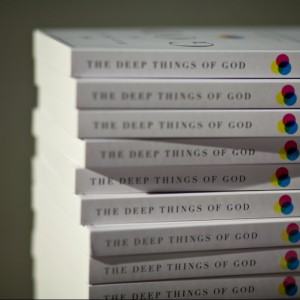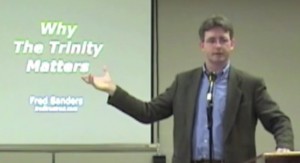 Here’s another set of reviews, responses, and reactions to my recent book The Deep Things of God: How the Trinity Changes Everything.
Here’s another set of reviews, responses, and reactions to my recent book The Deep Things of God: How the Trinity Changes Everything.
Aaron Armstrong at Blogging Theologically says in his review that “we don’t have to settle for a shallow picture of God,” because God “wants us to experience all of Him—Father, Son and Spirit.” He outlines the book helpfully:
As he examines the economy of salvation, Sanders points out that it is necessarily Trinitarian. God the Father sends God the Son who is empowered by God the Holy Spirit. All three work together as the Father ordains, the Son accomplishes and the Holy Spirit applies salvation to those who would believe. To look at it—and I mean really look at it—it’s breathtaking, especially as you see the Trinity in what we are saved into (the life of Christ). Sanders suggests that as we become more explicitly Trinitarian in our understanding of the gospel, we should simultaneously become more Christ-centered. Many of us can fall prey to the temptation to “grasp Christ in abstraction from the Father and the Spirit,” (p. 168), but the doctrine of the Trinity prevents us from doing so in “a Father-forgetting or Spirit-ignoring manner” (p. 171).
Nathaniel Claiborne at Think Theologically says Deep Things is “a great introduction for someone who doesn’t necessarily read a lot of theological works, but is a committed evangelical Christian who wants to grow in their knowledge of God.” He even goes on to say that it would be “a great Christmas present for such a person.” Claiborne nails a central idea in this summary:
Starting with a basic understanding of the gospel, that Christ died for my sins and rose from the dead, he then shows how a progression of questions leads one right to the doctrine of the Trinity:
*What must I do to be saved? (soteriology)
*How did Jesus bring about this salvation? (atonement)
*Who must Jesus be if he is capable of saving in this way? (Incarnation)
*Who must God be if that is true of Jesus? (Trinity)
Roger Overton at the venerable A-Team Blog notes that the book not only argues for the importance of the Trinity to evangelicals, but also “cites a rich history of evangelical authors to show that deep down it’s been important all along.”
Deep Things…assumes the biblical nature of the Trinity and explores what it means for other important Christian doctrines. Though this theology is embedded throughout evangelical writings, The Deep Things of God provides a unique synthesis of thought and application that will challenge readers to thoroughly consider the Trinity in all the right ways. Those who are not accustomed to reading theological books will likely struggle through certain portions of the book (particularly the first chapter), but will undoubtedly benefit from the rest of it.
At Pastor Adam Rumball’s blog, he says you can’t convict him of being Trinity-forgetful, but pledges, “after reading this, I will certainly celebrate it more explicitly in my teaching ministry.”
The best tool in this book is the diagrams so that I can try to explain a difficult concept that the Bible demands we affirm. If you cannot explain the Trinity over a meal with a loved one, then read this book.
Michael DeBusk at Crabapple Baptist Church in Atlanta has posted audio from the event I did there last week. We had a great time and covered the three big questions evangelicals ask about the Trinity. Well, two and a half. It’s a 90-minute mp3.
 Update: Pastor Michael has posted two videos from the event as well. Check them out here. The first one is a 72-minute lecture (with pictures!) on “3 Good Questions About the Trinity,” which starts with the story of how I once poured a quart of oil into an engine block through the dipstick hole, and includes the story of the worst Trinity question I ever heard. The second video is a 25-minute Q&A which covers topics like Jehovah’s Witnesses, Mormons, analogies for the Trinity, Dorothy Sayers’ Mind of the Maker, and more.
Update: Pastor Michael has posted two videos from the event as well. Check them out here. The first one is a 72-minute lecture (with pictures!) on “3 Good Questions About the Trinity,” which starts with the story of how I once poured a quart of oil into an engine block through the dipstick hole, and includes the story of the worst Trinity question I ever heard. The second video is a 25-minute Q&A which covers topics like Jehovah’s Witnesses, Mormons, analogies for the Trinity, Dorothy Sayers’ Mind of the Maker, and more.